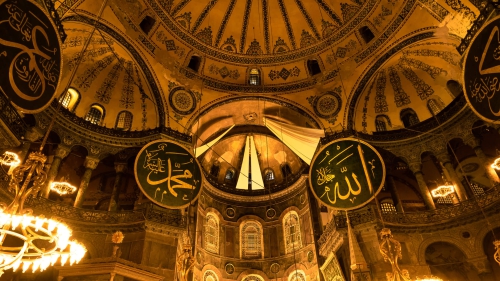What Did Prophet Jesus and Other Prophets Say About the Greatest Commandments?
 {file:content.php} {function:blp_getCustomField} {postID:103494} {customField:theClapCount} {default:0}not-in-use-in-plain-child
{file:content.php} {function:blp_getCustomField} {postID:103494} {customField:theClapCount} {default:0}not-in-use-in-plain-child



Almost 2,000 years ago, a remarkable exchange took place between Prophet Jesus and a Jewish teacher of the Torah in Jerusalem.
This profound conversation revealed the essence of spiritual life and commandments, uniting the teachings of the Torah, Gospel, and Qur’an. Below, we explore this dialogue and its implications for followers of all Abrahamic faiths.
The Question to Prophet Jesus
A Jewish teacher, impressed by Prophet Jesus' wisdom, posed a critical question:
"Which of the hundreds of commandments in the Torah is the most important one to do?"
Prophet Jesus, quoting directly from the Torah, replied:
“The most important one is this: ‘Hear, O Israel: The Lord our God, the Lord is One. Love the Lord your God with all your heart, soul, mind, and strength.’ (Deuteronomy 6:4-5) The second is this: ‘Love your neighbor as yourself.’ (Leviticus 19:18) There is no commandment greater than these.” (Mark 12:28-34)
The Jewish teacher affirmed Prophet Jesus' answer, emphasizing that love for God and neighbor is greater than all rituals. Jesus, recognizing the man’s wisdom, declared:
“You are not far from the kingdom of God.”
Key Lessons from This Dialogue
1. Prophet Jesus' Teachings Focused on Love and Obedience
Jesus emphasized love for God and humanity as the foundation of faith. He did not claim divinity or refer to salvation through belief in him as the Son of God. Instead, he reinforced Torah commandments:
“Until the heavens and earth pass away, not one letter will pass from the Torah until all is fulfilled.” (Matthew 5:17-19)
2. The Greatest Commandments Are Eternal
Prophet Jesus’ teachings on love and obedience to God’s commandments remain central. In the Gospel, Jesus consistently stated:
“If you love me, keep my commandments.” (John 14:15)
“If you want to enter (holy) life, obey the commandments.” (Matthew 19:17)
Prophet Muhammad ﷺ and the Greatest Verse in the Qur’an
Over 600 years later, in Medina, Prophet Muhammad ﷺ emphasized the oneness of God through Ayah al-Kursi (Quran 2:255), often regarded as the most powerful verse in the Qur’an:
“Allah: there is no true God but Him. The Ever-Living, the Eternal Master of all. Neither drowsiness nor sleep overtakes Him...”
Prophet Muhammad ﷺ taught the significance of reciting this verse:
“One who recites it after every prayer is under the care of God.” (Nasai, Bukhari)
Common Themes Across Scriptures
Prophets consistently highlighted the oneness of God and obedience to His commandments:
- On God’s Oneness:
- “I am your Lord; besides Me, there is no Savior.” (Isaiah 43:11)
- “You shall acknowledge no God but Me.” (Hosea 13:4)
- On God’s Eternal Nature:
- “He who guards Israel shall neither slumber nor sleep.” (Psalm 121:3-4)
- “The Ever-Living, the Eternal Master of all.” (Quran 2:255)
- On God as Creator:
- “My help comes from the LORD, Maker of heaven and earth.” (Psalm 121:2)
- “His is all that is in the heavens and earth.” (Quran 2:255)
Unity in Commandments
The teachings of Prophet Jesus, Prophet Muhammad ﷺ, and earlier prophets like Moses and David emphasize the eternal commandments of love, faith, and obedience. By following these universal principles, individuals of all faiths can achieve spiritual fulfillment and harmony.
As Prophet Muhammad ﷺ affirmed, the recitation of Ayah al-Kursi and commitment to God’s commandments offer divine protection and guidance:
“Everything has its pinnacle, and the pinnacle of the Qur’an is Ayah al-Kursi.” (Tirmidhi)
Topics: Ayat Al Kursi (Throne Verse), Bible, Interfaith, Prophet Jesus (Isa), Quran, Torah
Related Suggestions
In accordance with Title 17 U.S.C. Section 107, and such (and all) material on this site is distributed without profit to those who have expressed a prior interest in receiving the included information for research and educational purposes.














